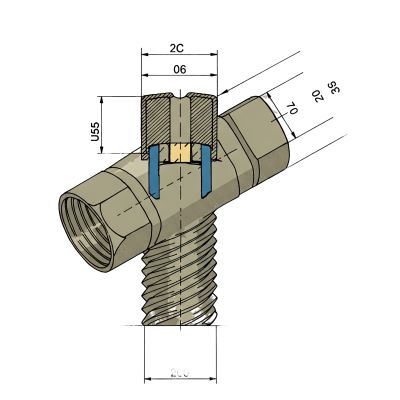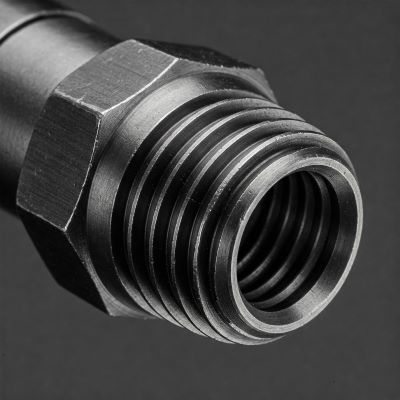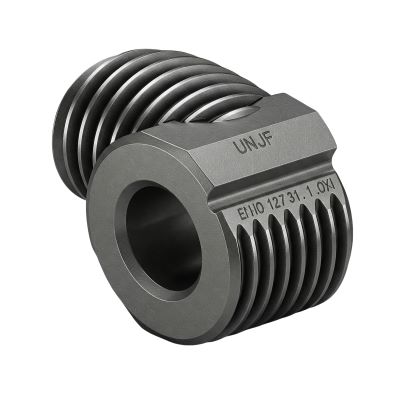When working with threaded fasteners, selecting the right thread type is crucial for ensuring strength, durability, and compatibility with your application. Three commonly used thread types in precision engineering and high-stress environments are UNF (Unified National Fine), UNEF (Unified National Extra Fine), and UNJF (Unified National Fine – J Form). Each of these has unique characteristics that make them suitable for specific applications.
This article will break down the differences between these thread types and guide you in choosing the right one for your project.
What Are UNF, UNEF, and UNJF Threads?
Unified National Fine (UNF) Threads
UNF threads are a widely used fine-thread standard under the Unified Thread Standard (UTS). They have a finer pitch than Unified National Coarse (UNC) threads, which provides better resistance to loosening due to vibration.
Common Uses of UNF Threads:
➡️ Automotive applications (e.g., bolts, screws in engine components)
➡️ General engineering and machinery
➡️ Aerospace and structural fasteners
Unified National Extra Fine (UNEF) Threads
UNEF threads are even finer than UNF threads, meaning they have more threads per inch (TPI). This fine threading provides a higher level of precision and a stronger hold in thinner materials.
Common Uses of UNEF Threads:
➡️ Precision instruments and electronics
➡️ Thin-walled materials (e.g., aluminum, sheet metal)
➡️ Aerospace and military applications requiring high-precision fasteners
Unified National Fine – J Form (UNJF) Threads
UNJF threads are similar to UNF threads but with a key difference: they feature a larger root radius. This design enhancement increases fatigue resistance, making them ideal for high-stress applications where failure is not an option.
Common Uses of UNJF Threads:
➡️ Aerospace fasteners (bolts, screws, studs)
➡️ Military applications requiring extreme durability
➡️ High-vibration environments where fatigue resistance is critical
Key Differences Between UNF, UNEF, and UNJF Threads
Thread Pitch & Threads Per Inch (TPI)
➡️ UNF Threads: Have a fine pitch, making them more secure than UNC threads but easier to assemble and disassemble compared to UNEF threads.
➡️ UNEF Threads: Have an extra fine pitch, resulting in a higher TPI, which is beneficial for thin-walled materials and precision applications.
➡️ UNJF Threads: Share the same TPI as UNF threads but with a larger root radius, enhancing fatigue resistance.
Strength & Fatigue Resistance
➡️ UNF Threads: Offer good strength and are commonly used in automotive and machinery applications.
➡️ UNEF Threads: Provide the highest TPI but may have reduced strength due to their finer pitch, making them ideal for applications requiring high precision.
➡️ UNJF Threads: Feature increased fatigue resistance due to the larger root radius, making them the strongest option among the three for high-stress applications.
Common Materials & Coatings Used
➡️ UNF Threads: Found in steel, stainless steel, and titanium fasteners, often with zinc or cadmium coatings for corrosion resistance.
➡️ UNEF Threads: Used in brass, aluminum, and other lightweight materials, often with anodized or nickel-plated coatings for durability.
➡️ UNJF Threads: Typically used in aerospace-grade materials, such as titanium or high-strength alloys, often coated with corrosion-resistant finishes like silver plating.
Applications of Each Thread Type
UNF Applications
➡️ Automotive fasteners (engine and suspension components)
➡️ Machinery and equipment bolts
➡️ General industrial and mechanical applications
UNEF Applications
➡️ Precision electronics and instrumentation
➡️ Aerospace fasteners for lightweight structures
➡️ Threaded connections in thin-walled materials
UNJF Applications
➡️ Aircraft and aerospace fasteners requiring high fatigue resistance
➡️ Military-grade fasteners for extreme durability
➡️ High-vibration environments (e.g., jet engines, turbines)
How to Choose the Right Thread for Your Project
Factors to Consider:
-
Load Capacity: Choose UNJF threads for high-load and high-fatigue applications, while UNF and UNEF are suitable for general and precision fastening.
-
Vibration Resistance: UNF and UNJF threads are ideal for environments with high vibration, such as automotive and aerospace industries.
-
Material Compatibility: UNEF threads are best for thinner materials, while UNJF threads are preferred for aerospace alloys.
Environmental Considerations:
➡️ Corrosion Resistance: Consider coated or plated fasteners for outdoor and marine applications.
➡️ Temperature Tolerance: Aerospace and military applications often require high-temperature-resistant threads like UNJF.
➡️ Stress and Fatigue Conditions: If your project involves cyclical loading or extreme stress, UNJF threads are the best choice.
Industry Standards and Specifications:
➡️ UNF & UNEF: Governed by ASME B1.1 and widely accepted in automotive and general engineering industries.
➡️ UNJF: Specified under MIL-S and aerospace industry standards for high-performance applications.
Conclusion
Selecting the right thread type—UNF, UNEF, or UNJF—depends on the specific needs of your project. UNF threads are widely used in general engineering and automotive applications, UNEF threads provide high precision for thin materials, and UNJF threads offer superior fatigue resistance for aerospace and military applications.
Choosing the correct thread ensures durability, reliability, and performance. Before making a selection, always check industry standards and consider load, vibration, and environmental factors to make the best choice for your application. If in doubt, consult with a fastener expert to ensure compatibility and safety.
Post time: Feb-25-2025




